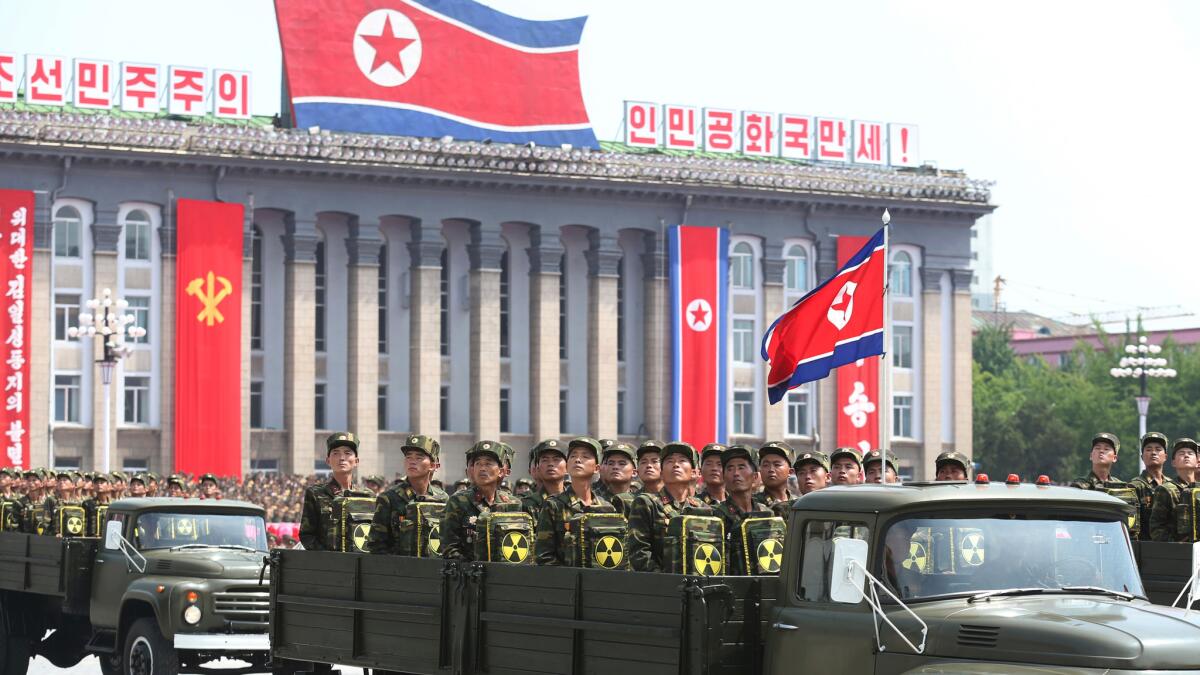North Koreans perform $975 million worth of forced labor each year

- Share via
Reporting from Seoul — The value of all the unpaid labor that North Koreans are forced to perform by their government amounts to around $975 million annually, according to a new report by Open North Korea, a Seoul-based NGO.
The report, titled “Sweatshop, North Korea,” estimates that 400,000 people are in the lowest class of forced laborers, called dolgyeokdae. The country has a total population of 25 million.
This tier of workers is made up of military-style brigades of ragtag youngsters assembled by local governments and put to work on construction sites for little to no pay. They are called on to complete major construction projects around the country, the report says, often working late into the night without safety equipment.
Park Kyung-ho, a former dolgyeokdae worker who fled North Korea in 2009 and now lives in South Korea, is quoted in the report saying that his monthly earnings were 120 North Korean won per month — less than $1 today, at official exchange rates, barely enough to buy two pieces of candy.
“We were required to do 10 years of what was effectively unpaid labor,” Park said.
Dolgyeokdae workers are generally young and untrained, resulting in frequent accidents. When these accidents cause injury or death, no compensation is provided to the victim or his family, the report says.
But with no financial incentive to work hard, and no room for professional advancement, what keeps North Koreans toiling away at hard, physical labor? “Sweatshop” says that beyond the threat of being sent to prison if they don’t comply, glorifying their leader is the only motivation left to dulgyeokdae workers.
The report describes how dulgyeokdae units are regularly shown on North Korean state television working outside in subzero temperatures, and are commended for their “outstanding loyalty to the Supreme Leader.”
A step up the ladder from dolgyeokdae is North Korea’s 1.2-million soldier army, which is often mobilized for work on construction projects that are unrelated to national defense, including building private villas for top officials.
Another category is made up of groups of women, called inminban, who are required to carry out basic neighborhood maintenance, including polishing the monuments to North Korea’s leadership that stand in every town, cleaning road and train lines, and doing agricultural work at harvest time. The report says that when such women are sent to work on construction sites, they are not paid and are required to purchase materials with their own money.
But not all North Koreans live like this. The country has an elite class of government officials and businesspeople who live comfortably in modern apartments and travel abroad. There is also a class of North Koreans who earn decent livings trading goods on the black market. Visitors nowadays to Pyongyang, the capital city, come home with stories of streets full of new cars and stylishly dressed locals carrying cellphones and expensive handbags.
It is difficult for North Koreans who are not born into this wealthy elite to move up the social ladder, even if they are talented or diligent. “Sweatshop” contends that North Koreans have no right to choose their own careers, and are instead assigned careers based on their family backgrounds.
People with no government connections, or money to bribe their way into plum postings in civil service or law enforcement, typically end up in the downtrodden classes described in the report.
And this reserve army of people with little upward mobility, and few other options, is called upon to complete tasks dictated by the state.
Sandra Fahy, an assistant professor of anthropology at Sophia University in Tokyo, says North Koreans are accustomed to calls for collective action, however exploitative. “The idea of pulling together and organizing efforts toward a goal - when the state dictates it -- is deeply familiar for North Koreans,” said Fahy, author of “Marching Through Suffering,” a work of history based on oral testimonies of North Koreans who lived through the famine of the 1990s.
The report is based on interviews with North Korean defectors who have experience being caught in North Korea’s broad system of labor exploitation. The cruel picture painted in “Sweatshop” won’t be new or surprising to seasoned observers of North Korea, but the report’s authors hope that their comprehensive summary can draw more attention to the issue of forced labor within North Korea, which they say is at times overshadowed by talk of North Koreans sent to work overseas in countries including China and Russia.
Human rights organizations have long been critical of North Korea for pressing its citizens to perform labor, often ahead of the major public events that the North Korean government invites the international media to cover. In May, North Korea held a Party Congress, a major political gathering, which was “made possible by the forced labor that untold thousands of North Koreans are subject to as part of everyday life,” said Phil Robertson, deputy director of Human Rights Watch’s Asia Division.
“North Korea has become one of the worst countries in the world in exacting forced labor from its people, but too often these abuses have remained hidden behind the vitriol of propaganda campaigns and the isolation of the North Korean countryside, where many of these rights violations take place,” Robertson wrote in an email.
For now, the full text of “Sweatshop” is only available in Korean, but Kwon Eun-kyoung, Director of Open North Korea, said by phone that she is working on an English-language translation of the report.
Borowiec is a special correspondent.
MORE WORLD NEWS
East Aleppo turning into ‘another Rwanda,’ U.N. envoy for Syria warns
These boys were born the year the U.S. invaded Afghanistan. Here’s what their lives are like today
More to Read
Sign up for Essential California
The most important California stories and recommendations in your inbox every morning.
You may occasionally receive promotional content from the Los Angeles Times.










